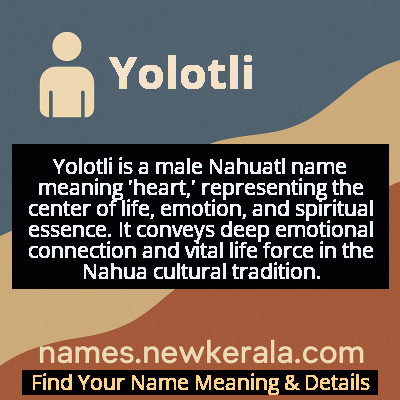Yolotli Name Meaning & Details
Origin, Popularity, Numerology Analysis & Name Meaning of Yolotli
Discover the origin, meaning, and cultural significance of the name YOLOTLI. Delve into its historical roots and explore the lasting impact it has had on communities and traditions.
Name
Yolotli
Gender
Male
Origin
Nahuatl
Lucky Number
9
Meaning of the Name - Yolotli
Yolotli is a male Nahuatl name meaning 'heart,' representing the center of life, emotion, and spiritual essence. It conveys deep emotional connection and vital life force in the Nahua cultural tradition.
Yolotli - Complete Numerology Analysis
Your Numerology Number
Based on Pythagorean Numerology System
Ruling Planet
Mars
Positive Nature
Generous, passionate, energetic, and humanitarian.
Negative Traits
Impulsive, impatient, moody, and can be overly emotional.
Lucky Colours
Red, maroon, scarlet.
Lucky Days
Tuesday.
Lucky Stones
Red coral, garnet.
Harmony Numbers
1, 2, 3, 6.
Best Suited Professions
Military, sports, philanthropy, leadership roles.
What People Like About You
Courage, energy, leadership, generosity.
Famous People Named Yolotli
Yolotli González
Mexican anthropologist and linguist
Leading researcher in Nahuatl language preservation and indigenous cultural studies
Yolotli Martínez
Traditional healer and community leader
Revived ancient Nahua healing practices and established cultural centers in Puebla
Yolotli Hernández
Educator and activist
Founded indigenous language schools in rural Mexican communities
Name Variations & International Equivalents
Click on blue names to explore their detailed meanings. Gray names with will be available soon.
Cultural & Historical Significance
Among contemporary Nahua communities, naming a child Yolotli expresses hope that they will embody strength, compassion, and spiritual centeredness. The name serves as a living link to indigenous identity and resistance against cultural assimilation, representing the enduring heartbeat of Nahua civilization through centuries of change. In ceremonial contexts, the heart symbolism extends to community wellbeing, as individuals named Yolotli are often expected to contribute to the collective 'heart' of their people through leadership, artistic expression, or cultural preservation.
Extended Personality Analysis
Individuals named Yolotli are often perceived as deeply compassionate, emotionally intelligent, and spiritually grounded. They tend to possess a natural empathy that allows them to connect with others on profound levels, often serving as emotional anchors in their communities. Their name meaning 'heart' seems to manifest in their personality through genuine warmth, sincerity, and an innate understanding of human emotions. Yolotli bearers typically demonstrate strong moral conviction and courage when defending their beliefs or protecting loved ones.
They approach life with passion and intensity, whether in personal relationships, creative pursuits, or professional endeavors. While they can be sensitive, this sensitivity is balanced by remarkable resilience - much like the physical heart that continues beating through life's challenges. Their emotional depth often makes them excellent listeners and trusted confidants, though they may need to guard against taking on others' emotional burdens too heavily. The name's cultural heritage also tends to instill a sense of responsibility toward community and tradition, making Yolotli individuals often deeply committed to causes larger than themselves.
Modern Usage & Popularity
In contemporary times, Yolotli remains primarily used within Nahua and broader Mexican indigenous communities, though it has gained some recognition among non-indigenous parents seeking meaningful, culturally rich names. The name maintains strong cultural authenticity and is rarely used outside specific cultural contexts. Among diaspora communities in the United States and elsewhere, Yolotli serves as an important marker of indigenous identity and cultural pride. While not appearing on mainstream popularity charts, its usage has seen a modest increase as part of the broader indigenous cultural renaissance movement. The name is particularly favored by families actively engaged in cultural preservation efforts or those wanting to honor their ancestral heritage in a profound way, with most bearers being male despite its technically unisexual classification.
Symbolic & Spiritual Meanings
Beyond its literal meaning of 'heart,' Yolotli symbolizes the vital center of existence - the source of life, emotion, and spiritual connection. In Nahua cosmology, the heart represents the meeting point between earthly and divine realms, making Yolotli a name that embodies spiritual bridge-building. Symbolically, it conveys emotional authenticity, moral courage, and the capacity for deep love and sacrifice. The heart in Mesoamerican tradition was also associated with the sun's movement and agricultural cycles, connecting the name to themes of renewal, sustenance, and cosmic harmony. Yolotli carries the metaphorical weight of being the 'pulse' of community and culture - essential, rhythmic, and life-sustaining. It suggests someone who operates from their core values rather than external pressures, representing integrity and emotional truth in a world often dominated by superficiality.

